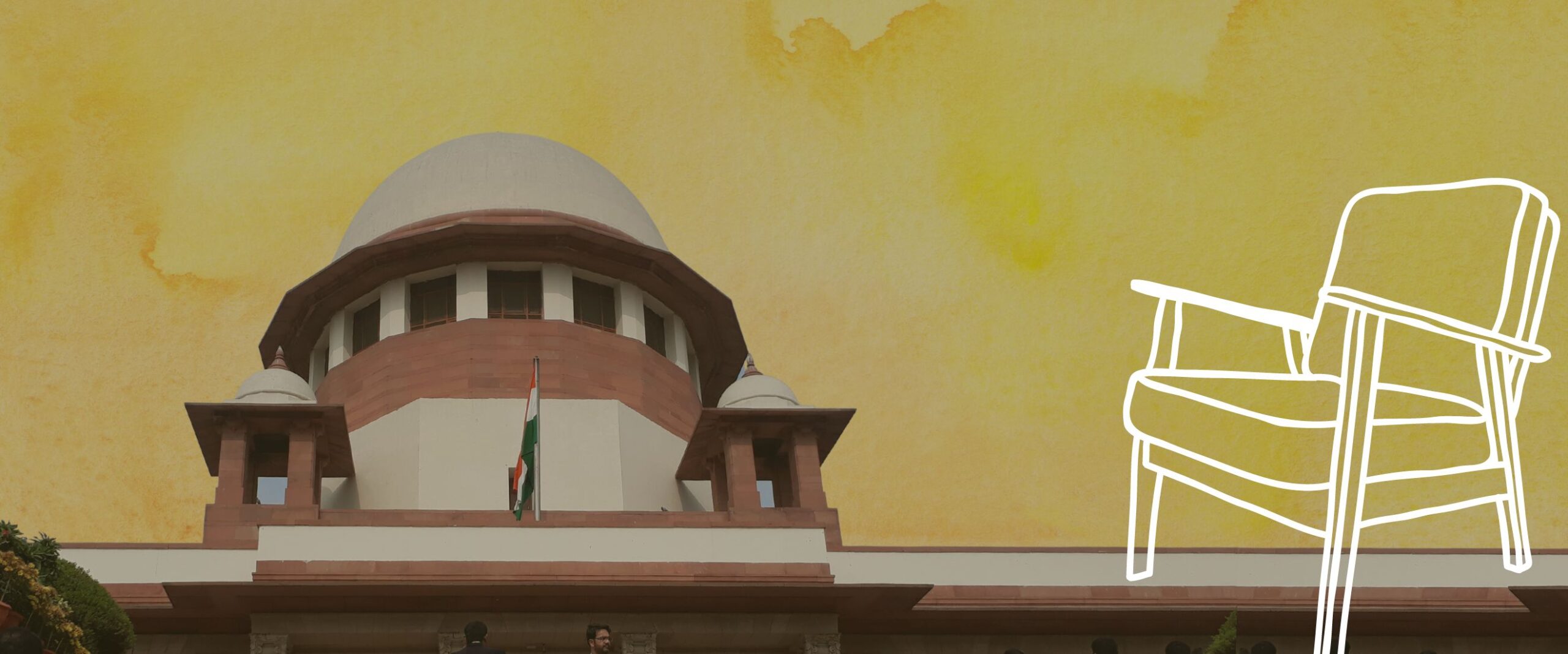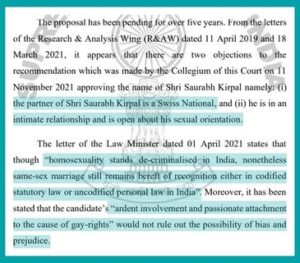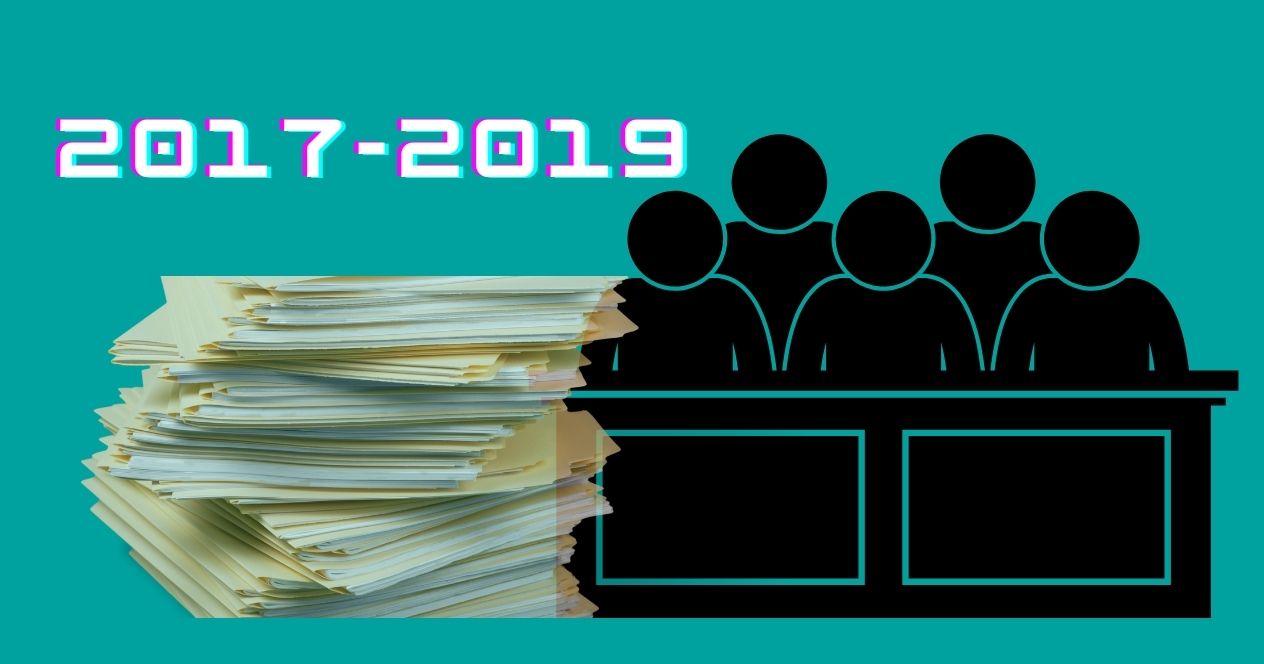Analysis
In Four Resolutions, SC Collegium Strikes Back at Union Government
The SC Collegium reiterated five names, highlighted delays caused by the Union, and gave insight into Union’s Considerations in appointments

Yesterday, the latest chapter in the tussle over judicial appointments between the Union and the Supreme Court unfolded. The SC published four resolutions, reiterating the appointments of Mr. Sundaresan (to the Bombay HC), Mr. Saurabh Kirpal (to the Delhi HC), Mr. R. John Sathyan (to the Madras HC), and Mr. Amitesh Banerjee and Mr. Sakya Sen (to the Calcutta HC).
The Union government has recently brought the concerns of transparency in the Judge appointment process to the forefront. They also stated that the mammoth pendency numbers, coupled with vacancies across India’s Courts, threatened the efficient functioning of the Judiciary. A common solution suggested by the Union for these issues has also been their main demand in the age-old SC-Union struggle—more Executive control over the judicial appointments. In many ways, these resolutions appear to be the SC Collegium’s response to the Union’s publicly made claims.
Collegium States that Union Cannot Repeatedly Reject Recommendations
In these resolutions, the SC struck back at the Union for rejecting appointments, despite the SC’s reiteration of those recommendations. Typically, the Union is bound to accept appointments that the Collegium has suggested for the second time. The Memorandum of Procedure of Appointment of High Court Judges (MoP), states that when a recommendation is sent back by the Union, the Chief Justice of India will review the names and the Union’s reasoning for rejecting them. If the Collegium reiterates that name, i.e., recommends the name again, the appointment must go through to the Prime Minister who will then advise the President to make the appointment.
However, the SC noted that the in case of Mr. Amitesh Banerjee and Mr. Sakya Sen, the Union rejected the Collegium’s reiteration in November 2022, without ‘any fresh material or ground’. The Collegium wrote that ‘it was not open to the Department to repeatedly send back the same proposal which has been reiterated by the Supreme Court Collegium after duly considering the objections of the Government.’
This year, Union Law Minister Kiren Rijiju suggested that the Union is not bound by the MoP as it is ‘pending finalisation’. He pointed out that in 2017, Justice J. Chelameshwar wrote a concurring opinion in a 7-Judge Bench case where he observed that there is a need to ‘revisit’ the process of judicial appointments. The Union was merely following the Court’s directions.
Recently, while hearings were underway in a 2021 contempt petition filed against the Union for delays in appointments, a Bench consisting Justices S.K. Kaul, A.S. Oka and Vikram Nath, stated that the MoP was finalised and was only open to improvements. Notably, Justice Kaul asserted that while the Collegium was open to accepting suggestions from the Union on changes to the judicial appointment process, the Union is bound to accept reiterations as long the current system is in force.
Recommendations Provide Insight to the Collegium and Union’s Thinking
Most notably, for the first time since October 2019, the resolutions were accompanied by clear reasons for recommending a Judge’s name. The practice of providing reasons for a recommendation was introduced on October 3rd, 2017, during the tenure of CJI Dipak Misra, when a collegium resolution declared that ‘resolutions with reasons’ would be published for ‘ensuring transparency of collegium system’. For two years, the Collegium published recommendations with reasons, which were often criticised for being vague. The practice continued till October 2019, and came to a halt under former Chief Justice Ranjan Gogoi.
Typically, the Union government’s considerations for sending back a recommendation are not made known to the public. Recommendations either stall for years with no progress from the Union, or are rejected silently in an internal process between the Union and SC, far from the public eye. In this series of resolutions, the SC Collegium directly quoted the Union’s letters, displaying its rationale and reasoning, giving an unprecedented peek into the rather opaque process.
In the four resolutions the Collegium listed not only their considerations in recommending and reiterating the judges, but also explained why the concerns raised by the Union had no standing.
 On the recommendation of Mr. Saurabh Kirpal to the Delhi HC, the Collegium rejected the Union’s concerns that his partner is a Swiss national and that he is open about his sexual orientation. Referring to the Constitution Bench Judgment that held that ‘every individual is entitled to maintain their own dignity and individuality, based on sexual orientation’, the Collegium wrote that ‘it would be manifestly contrary to the constitutional principles’ if Mr. Kirpal’s candidature is rejected on those grounds. The Collegium went on to state that Mr. Kirpal possesses ‘competence, integrity and intellect’, and has displayed exceptional ‘conduct and behaviour’.
On the recommendation of Mr. Saurabh Kirpal to the Delhi HC, the Collegium rejected the Union’s concerns that his partner is a Swiss national and that he is open about his sexual orientation. Referring to the Constitution Bench Judgment that held that ‘every individual is entitled to maintain their own dignity and individuality, based on sexual orientation’, the Collegium wrote that ‘it would be manifestly contrary to the constitutional principles’ if Mr. Kirpal’s candidature is rejected on those grounds. The Collegium went on to state that Mr. Kirpal possesses ‘competence, integrity and intellect’, and has displayed exceptional ‘conduct and behaviour’.
On the recommendation of Mr. Somasekhar Sundaresan to the Bombay HC, the Union had raised concerns that he expressed views on cases that were pending before various Courts. The Union believed that Mr. Sundaresan was a ‘highly biased, opinionated person’ and has been ‘selectively critical on the social media on the important policies, initiatives and directions of the Government’. The Union also seems to suggest that he has links to political parties and strong ideological leanings. The SC Collegium wrote that Mr. Sundearesan was merely exercising his right to freedom of speech, which did not disentitle him from being eligible for appointment as a Judge. Further, the SC Collegium stated that he possessed ‘high integrity, honesty, skill, high order of emotional stability, firmness, serenity, legal soundness, ability and endurance’ making him deserving of a judgeship.
On the recommendation of Mr. R. John Sathyan, the Union had rejected the appointment on grounds that he had made posts that were critical of Prime Minister Narendra Modi, and on the suicide of a NEET aspirant Anitha with the tag ‘ShameofYouIndia’. The SC stated that these comments did not affect the ‘suitability, character or integrity’ of Mr. Sathyan.
SC Collegium Highlights Inordinate Delays in Appointments
With regards to the recommendation of Mr. Saurabh Kirpal, the SC pointed out that the recommendation was first made on October 13th, 2017 by the Collegium of the Delhi HC, and less than a month later, by the SC Collegium. However, the proposal has been pending for five years.
The Supreme Court has on various occasions criticised the delays caused by the Union in processing the recommendations made by the Collegium, stating that it frustrates the method of appointment. On the other hand, Law Minister Kiran Rijiju laid blame for vacancies on the Supreme Court, arguing that the Union must have a larger say in the appointment process. Until a new system of appointments emerges, Rijiju states that the vacancy issue will persist.
In October 2021, the Supreme Court admitted a contempt petition filed by the Advocates Association Bengaluru against the Union, for failing to approve Collegium Resolutions within the timelines provided by the SC in April 2021. Putting all the Bench’s concerns about delays on record, they wrote that they ‘are really unable to understand or appreciate such delays’. The Bench observed that delays in the process discourage lawyers from accepting appointments—a practice being used as a ‘sort of device’ to force the recommended candidates to withdraw.
The four resolutions mark an important turning point in the tussle between the Union and the SC Collegium over the appointments of Judges. We are yet to see whether these scathing words written by the Collegium will have a material impact on the appointment of the five Judges.




